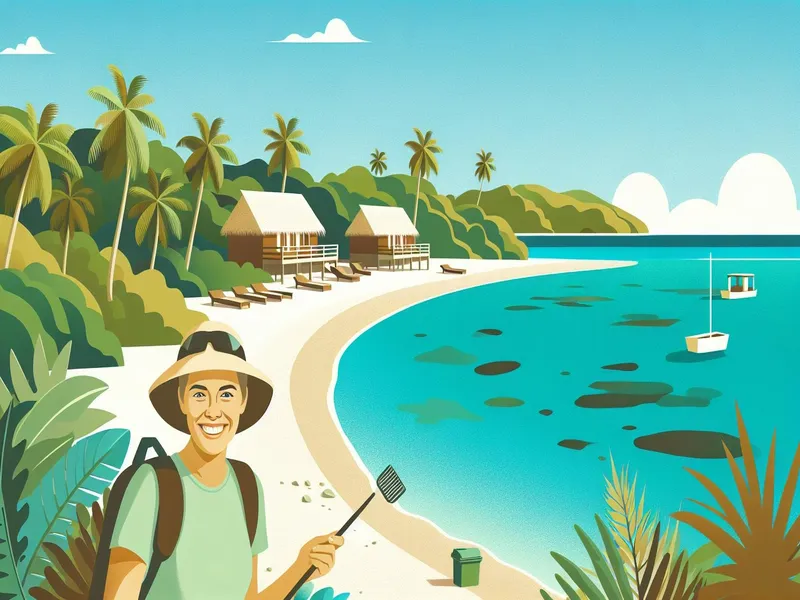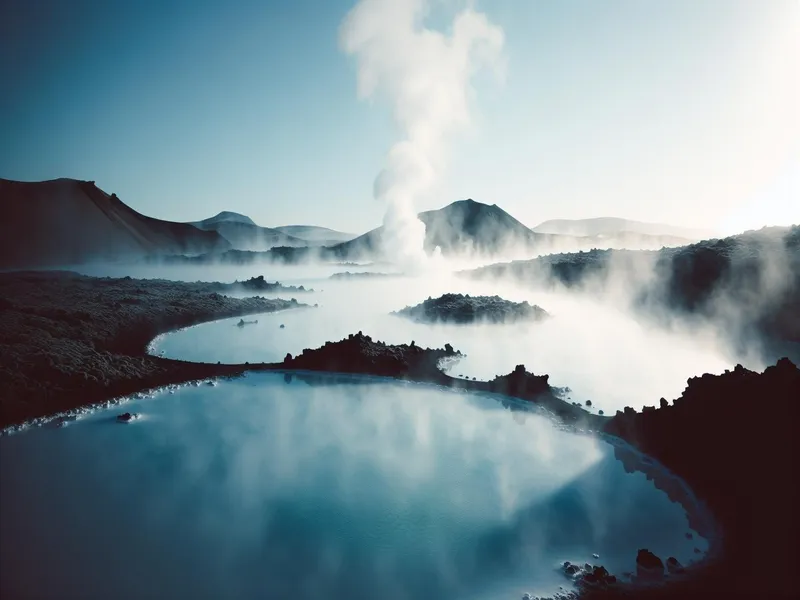
Whether you’re planning a trip to Australia, New Zealand, or the Pacific Islands, sustainable travel practices can help preserve these natural wonders for future generations.
Ignoring eco-friendly travel options could lead to environmental degradation and loss of biodiversity. Over-tourism and irresponsible practices threaten the very beauty we seek to enjoy. It’s crucial to make mindful choices now before it’s too late.
I’ve spent years exploring Oceania’s breathtaking landscapes while prioritizing sustainability. My experiences have shown me how small changes can significantly impact preserving these stunning environments.
Different travelers have unique needs—families might look for kid-friendly eco-lodges, while solo adventurers could seek out remote hiking trails. Tailoring your travel plans ensures you get the most out of your journey without compromising on sustainability.
I understand the challenges of finding reliable information on eco travel. Trust me; I’ve navigated this path myself and am here to guide you through making responsible choices that benefit both you and our planet. For more tips on sustainable activities during your travels, check out our guide on travel activities.
What Is Eco Travel?
Eco travel is all about exploring the world while minimizing your impact on the environment. Think of it as traveling with a purpose—sorta like being Batman, but for nature. Instead of just sightseeing, you’re making choices that help preserve our planet’s beauty and biodiversity.
Sustainable Practices
When we talk about eco travel, sustainable practices are key. This means choosing activities and accommodations that have minimal negative effects on the environment. For instance:
- Staying at Eco-Friendly Lodges: These places often use renewable energy sources like solar panels and have waste reduction programs.
- Using Public Transportation: Opt for buses, trains, or bikes instead of renting cars to reduce carbon emissions.
- Supporting Local Communities: Buy local products and eat at locally-owned restaurants to boost the local economy.
Hypothetical Scenario
Imagine you’re in New Zealand, one of Oceania’s gems. Instead of driving everywhere, you decide to hop on a bike to explore the stunning landscapes. You stay at a lodge that uses rainwater harvesting systems and serves organic food sourced from nearby farms. Not only do you get an authentic experience, but you also contribute to preserving this beautiful region.
Personal Anecdote
I remember my trip to Fiji where I stayed in a small village resort powered entirely by solar energy. The staff were locals who shared their traditions with guests, creating an enriching cultural exchange. We even participated in beach cleanups organized by the resort—turns out picking up trash can be surprisingly fulfilling!
Key Components of Eco Travel
To make eco travel straightforward, focus on these key components:
- Reduce Waste: Carry reusable water bottles and bags.
- Conserve Water & Energy: Take shorter showers; turn off lights when not needed.
- Respect Wildlife & Nature: Observe animals from a distance without disturbing them; stick to marked trails.
By incorporating these practices into your travels around Oceania—or anywhere else—you’ll not only enjoy unique experiences but also become part of a growing movement dedicated to protecting our planet for future generations.
Key Destinations in Oceania for Eco Travel

Exploring eco travel in Oceania opens up a world of stunning landscapes and rich cultures. Let me share some top spots you shouldn’t miss.
Australia
Australia’s diverse ecosystems make it an eco travel paradise. If you’re visiting, Daintree Rainforest is a must-see. It’s one of the oldest rainforests on Earth, and its unique flora and fauna will blow your mind. Stay at eco-lodges like Silky Oaks Lodge, which blends luxury with sustainability.
Another gem is the Great Barrier Reef. Opt for snorkeling tours that focus on reef conservation. I once joined a tour where they taught us about coral bleaching while we explored vibrant marine life.
New Zealand
New Zealand takes sustainable tourism seriously. In Rotorua, geothermal parks offer a peek into Earth’s natural power. I stayed at an eco-friendly lodge near Lake Rotorua, where they used geothermal energy for heating—pretty cool, huh?
Check out Fiordland National Park if you’re into dramatic landscapes. The park’s guided tours emphasize minimal impact, so you can enjoy sights like Milford Sound without leaving a trace.
Fiji
Fiji’s islands are perfect for eco-conscious travelers. On my trip to Taveuni Island, known as the “Garden Island,” I stayed at an ecolodge that sourced food locally and supported community projects. It was amazing to see how our stay directly benefited locals.
Coral planting initiatives are also popular here. Participating in one not only helps restore reefs but gives you hands-on experience in conservation efforts.
Papua New Guinea
Papua New Guinea offers raw, untouched beauty ideal for eco-travelers seeking adventure off the beaten path. In the Kokoda Track, trekking through lush jungles feels like stepping back in time—I met friendly locals who shared their knowledge about native plants and wildlife.
For marine enthusiasts, diving sites like those around Milne Bay Province showcase pristine coral gardens teeming with life. Choose operators committed to protecting these underwater treasures by following strict environmental guidelines.
Eco-Friendly Accommodation Options

Exploring Oceania sustainably includes choosing eco-friendly places to stay. Let’s jump into some awesome options.
Eco Lodges
Eco lodges offer a blend of comfort and sustainability. These lodges use renewable energy sources like solar panels and have water conservation systems in place. I stayed at Thala Beach Nature Reserve in Australia, where the lodge blends seamlessly with the rainforest. Imagine sipping coffee on your balcony while surrounded by nature’s orchestra—birds chirping, leaves rustling, and distant waves crashing.
Another great example is Treetops Lodge & Estate in New Zealand. This place goes beyond just being green; they actively participate in reforestation projects. They plant trees for every guest who stays there, making you feel part of something bigger.
Camping and Glamping
Camping lets you immerse yourself directly in nature, but if roughing it isn’t your thing, glamping offers a luxurious twist on traditional camping. During my trip to Fiji, I tried glamping at Nanuku Auberge Resort, where tents included plush beds and hot showers—all powered by solar energy.
For those who prefer a more rugged experience, many national parks across Oceania offer campgrounds equipped with eco-friendly facilities like composting toilets and recycling stations. Think of it as “roughing it” without actually roughing it.
Sustainable Resorts
Sustainable resorts are basically the eco-warriors of accommodation options—they go all out to be green while offering top-notch amenities. Six Senses Fiji stands out because they generate their own electricity using solar power and harvest rainwater for daily use.
When I visited the Great Barrier Reef, I stayed at Lady Elliot Island Eco Resort. They’re committed to protecting marine life through coral planting programs and educating guests about reef conservation efforts. It’s like staying at a resort that’s also a guardian of the sea.
Choosing these accommodations not only gives you an amazing travel experience but also helps protect Oceania’s beautiful landscapes for future generations to enjoy.
Activities to Engage In
When it comes to eco travel in Oceania, there’s no shortage of amazing activities that let you connect with nature. Let’s jump into some of the best ways to make your trip both fun and sustainable.
Wildlife Conservation
One of my favorite things about traveling in Oceania is the chance to get up close and personal with its incredible wildlife. Whether you’re in Australia or New Zealand, there are plenty of opportunities to contribute to conservation efforts. For instance:
- Adopt a Koala: In places like Lone Pine Koala Sanctuary, you can adopt a koala, helping fund their care and habitat preservation.
- Marine Conservation Volunteering: Join programs that protect marine life. I once spent a week on the Great Barrier Reef planting coral—an unforgettable experience!
These activities not only give you an inside look at local wildlife but also allow you to play a part in preserving these species for future generations.
Sustainable Hiking and Trekking
Oceania’s landscapes are tailor-made for hiking enthusiasts. But did you know you can trek sustainably? It’s easier than it sounds:
- Stay on Marked Trails: This reduces erosion and protects native plants.
- Pack Out All Trash: Leave no trace behind; it’s crucial for maintaining pristine environments.
I remember hiking through New Zealand’s Fiordland National Park, armed with reusable water bottles and biodegradable soap. We made sure our presence had minimal impact on this stunning locale.
Community-Based Tourism
Supporting local communities is another way eco travel shines in Oceania. Engaging with locals gives you authentic experiences while bolstering community economies:
- Stay Local: Opt for family-run guesthouses or community lodges.
- Participate in Cultural Tours: Learn traditional crafts or cooking methods directly from indigenous people.
During my visit to Fiji, I stayed with a Fijian family who taught me how to cook lovo (a traditional underground oven meal). It was enriching and helped support their livelihood.
Benefits of Eco Travel in Oceania
Eco travel in Oceania isn’t just good for the planet; it’s a game-changer for your travel experience. When you choose eco-friendly options, you’re not only reducing your carbon footprint but also getting a richer, more authentic adventure.
Enhanced Connection with Nature
You won’t believe how much more connected to nature you’ll feel. Imagine waking up in an eco-lodge surrounded by the sounds of the Daintree Rainforest in Australia or snorkeling over vibrant coral reefs just off Fiji’s shores. These experiences are so much more meaningful when you know your stay supports conservation efforts.
Support for Local Communities
Eco travel often means staying at locally-owned accommodations and eating at family-run restaurants. It’s like choosing to shop at a local farmer’s market instead of a big-box store. You get unique products and experiences while directly supporting the people who live there. I remember my trip to New Zealand where I stayed at a small, family-owned bed and breakfast that sourced all its food from nearby farms—it felt amazing knowing my money helped sustain local livelihoods.
Low Environmental Impact
By opting for eco-friendly transportation like biking or using public transit, you’re helping reduce pollution and traffic congestion. In places like Sydney, taking ferries instead of cabs is not only greener but offers stunning views of the harbor—you get two perks for one!
Enriching Cultural Experiences
Engaging with indigenous communities can offer profound insights into their traditions and ways of life. During my visit to Papua New Guinea, I participated in a cultural tour led by local guides who shared fascinating stories about their heritage—something you’d never get from a typical touristy excursion.
Personal Growth and Awareness
Traveling sustainably can be eye-opening. You’ll learn about ecosystems, sustainability practices, and even gain new skills like composting or water conservation techniques that you can take back home. Think of it as “eco-education;” it’s like going back to school but way more fun because you’re learning through real-world experiences.
Here’s what you’ll gain:
- Deeper Appreciation: Understand ecosystems better.
- Renewed Perspective: See how daily actions impact the environment.
- New Skills: Learn sustainable practices applicable at home.
Choosing eco travel turns every part of your trip into an opportunity to do good—for yourself, local communities, and our beautiful planet Earth.
Tips for Responsible Travel
Traveling responsibly in Oceania isn’t just about protecting the environment, it’s also about enriching your experience. Here are some tips to help you make the most of your eco travel adventure.
Respect Local Cultures and Communities
When you visit places like Fiji or Papua New Guinea, you’ll encounter unique cultures. Show respect by learning a few local phrases and understanding customs. I remember visiting a small village in Fiji where the locals welcomed me with a traditional kava ceremony. It was an incredible experience that felt even more meaningful because I took the time to learn about their traditions beforehand.
Minimize Waste
Carry reusable items like water bottles, shopping bags, and utensils to cut down on single-use plastics. When I traveled through Australia’s Great Barrier Reef, many shops offered discounts if you brought your own cup or bag—it’s an easy way to live sustainably and save money.
Choose Eco-Friendly Accommodations
Stay at places committed to sustainability. Look for certifications like Green Globe or EarthCheck. On my trip to New Zealand, Treetops Lodge & Estate impressed me with its renewable energy use and reforestation projects. These kinds of accommodations don’t just provide comfort; they give back to nature too.
Support Local Economies
Spend your money at local businesses rather than international chains. In Vanuatu, I stayed at family-run bungalows and ate at local eateries—it not only boosted the local economy but also gave me an authentic taste of their culture.
Use Public Transport or Eco-Friendly Modes
Public transport reduces your carbon footprint compared to renting a car. While exploring Sydney, hopping on trains and buses was not only efficient but also gave me a chance to see the city from a different perspective—plus, it saved me from crazy parking fees!
Participate in Conservation Activities
Join activities that contribute positively to the environment. Volunteering can be both rewarding and educational. During my stay in Queensland’s Daintree Rainforest, I joined a tree-planting program which deepened my connection with the place—and left it greener than before.
Remember these tips when planning your next trip:
- Respect cultures: Learn local customs.
- Minimize waste: Use reusable items.
- Choose eco-friendly stays: Look for certified lodges.
- Support locals: Shop at family-run businesses.
- Use public transport: Reduce carbon footprint.
- Join conservation activities: Give back while traveling.
Summary
Eco travel in Oceania offers an incredible opportunity to explore some of the world’s most stunning natural landscapes while minimizing our environmental impact. By making mindful choices such as staying at eco-friendly lodges, using public transportation, and supporting local communities, we can ensure that our adventures contribute positively to these beautiful destinations.
My own experiences have shown me how enriching sustainable travel can be both for personal growth and for the planet. It’s about more than just seeing new places; it’s about connecting with nature learning from local cultures and leaving a positive footprint.
Let’s continue to embrace eco travel practices ensuring that future generations can enjoy Oceania’s unparalleled beauty. Remember every small action counts towards a bigger change so let’s make our journeys meaningful and responsible.